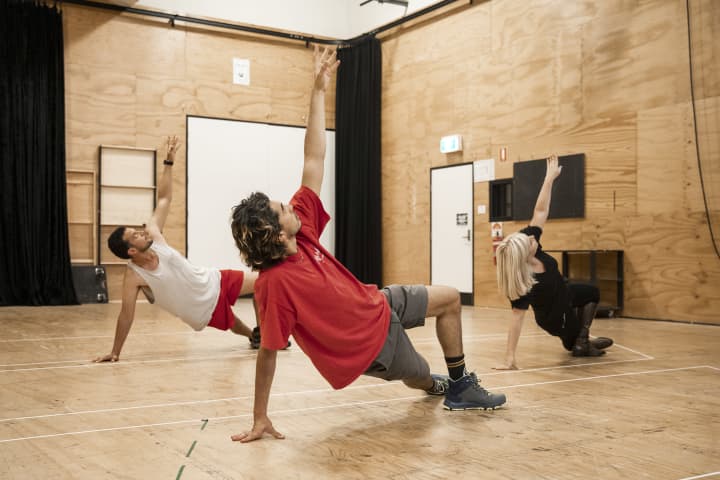Literary Director Chris Mead answers Anonymous’s multi-part question: If we wish to become a playwright how should we go about it? Are there textbooks you recommend? What length should we be writing? What are the play trends at the moment and what are the cliches?
Great questions, sharp and forward-thinking! Thanks Anonymous!
Broadly speaking, many playwrights tend to either have been actors or come at it from a more general interest in writing – journalism, law, history, literature or comedy for instance. Actors tend to have an uncanny sense of rhythm and how a scene should work, expand and contract, accelerate and relax, and a rich sense of what a character needs to breathe, manoeuvre and desire life. And playwrights coming from other fields are often animated by a more general sense of injustice, a specific story that needs telling and a love of being in a theatre, driven by its power to bewitch, enthral, persuade and outrage.
One of the most crucial things all good playwrights have is a brilliant memory, and an even better ear for the way different people speak. Some writers keep extensive journals to capture and be reminded of curious phrases or arguments; others can simply channel it, delighting in wordplay and power games.
Start writing and see what emerges for you. Be specific. Be bold. Be generous. Make it messy. Make it meaningful. And then get it on a stage somewhere in front of an audience. Then do it again! I say all that having read quite a funny interview recently with screenwriting guru Robert McKee, who insists that you cannot teach writing and all that’s waiting for most of us is the great emptiness!

A script in development at Cybec Electric 2020. Photo: James Henry
Books to read
Perhaps the most straightforward and direct book to read – other than plays, of course (and do try and read plays and playwrights you don’t know) – is David Edgar’s How Plays Work. I would though, with McKee, counsel caution with respect to any formulaic approach to writing; that is, be especially wary of guides, manuals or how-to-books with a number in the title (10 things you must do / 100 best plots / six fundamental stories etc). There have been rules in theatre, of course, but perhaps the most exacting one is the audience itself. Horace’s dictum is useful here: line 25 from his Ars Poetica: ‘decipimur specie recti’ – we are often misled, or undone, by the illusion of being right, of correctness, the appearance of rectitude.
As to length, well that’s a piece of string. What is considered full-length has changed since the days of Horace (who recommended, perhaps facetiously, that plays should all be five acts, at the very most!). Plays in MTC’s recent seasons have been anything from 50 A4 pages to 200 A4 pages. There is no rule here and I would recommend that once you start writing you think about the story you are telling and let that be the guide as to its length, not only to contain its content but crucially, in matching the form of the play – in every sense – to its content and themes.

Chris Mead with Cybec Electric participants. Photo: James Henry
Play trends and cliches
Because the internet has allowed us to look in places we rarely have had the chance to go in the past, theatre trends have atomised. As for theatre clichés, they are evergreens! And to be fair, writing a play is tough and the occasional wooden line, poor turn of phrase, no-dimensional character or lazy or modish situation is hard to avoid when writing a first draft. Over the coming months, I am worried about a heavy exhalation of COVID-inspired plays, just as there have been a rash of Trump plays, bushfire plays, internet / emoji / death of language or conspiracy plays. That said, what would a TikTok play even look like? That could be fun. Or maddening. At least it would be short!
At the present moment, theatre is in a real fight for its life – though there are green shoots, as they say, not only in other states in Australia, but across the world. My colleague Simon Stephens has an adaptation of a Portuguese novel about to open at the Donmar Warehouse in the form of a brilliant sound and light installation with the voice of Juliet Stevenson. And it’s playing four times a day to allow for social distancing. A clever response to the current restrictions.
‘As brilliant as some of this new TV writing is (and directing, producing and so on), it just cannot replace the joy and excitement of being in a theatre.’
One curious recent occurrence with playwriting is the retreat from story, with many young writers regarding story as being thoroughly co-opted, pillaged and degraded by Hollywood spectacle. The recent profusion of long-form writer / producer TV shows has challenged that, however, and has been a boon for those of us cooped up in our homes. As brilliant as some of this new TV writing is (and directing, producing and so on), it just cannot replace the joy and excitement of being in a theatre – most particularly when we bear witness to a character doing whatever it takes to overcome their suffering. Great writing features audacity, rage, joy, heartbreak, explosive humour, terrific ambition, urgency and great roles in a thrilling, surprising world. Too challenging? It should be.
With respect to theatre storytelling, we have seen plays tighten up and compress further, some entirely fragmenting, exploding notions of character or situation, or shrinking to tiny, quiet dramas, plays with few words, mostly ellipses; or conversely, plays that try to take on the state of the world and the nation, with playing times pushing out further and further, across multiple nights.
Finally, read some plays and playwrights’ work – for example: Seneca, Sarah Kane, Suzan-Lori Parks and, of course, Shakespeare – and take your guide and inspiration there.
Have something to ask MTC? You can submit your question and next week it might be yours that we answer.
Published on 24 July 2020





